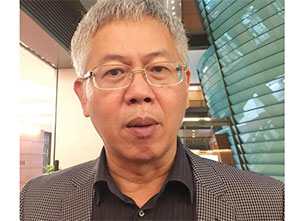NA Commission deputy chairman on lifting the retirement age
 |
The Pension Fund faces losses in the upcoming time, making an upward revision of the retirement age necessary. What do you think of this?
First of all, we need to answer the question why we should increase the retirement age.
The argument that it is a must because the Pension Fund will face imbalance in the forthcoming time is less than convincing, in my view. A large portion of the public and most National Assembly members agree with me on this and are not advocating the proposal.
Is it true that the Pension Fund will face imbalance in the upcoming time and what must we do?
The matter at hand is to identify what problems the social insurance system currently faces and how to tackle them. If it is still failing despite all our best efforts, we need to start thinking of increasing the retirement age and it must follow a specific trajectory.
Increasing the retirement age is not a rational measure. Assuming that if we increased retirement age for women to 58 (from the current 55) and for men to 62 (from the current 60), and find the Pension Fund in imbalance in five years, where does that leave us?
Not now, but during 2002-2003, the issue of increasing the retirement age was discussed. We engaged in field surveys to learn about public comments. I remembered when we came to survey a litter sweeping enterprise in Hanoi, many female labourers expressed their desire not to push off their retirement.
Is that case not specific to only a small segment of the labourers?
If environmental sanitation is a specific field, our country has a myriad of specific occupations, such as textile and clothing, mining, seafood processing or leather and footwear, just to name a few. Many kindergarten teachers and healthcare employees also said they do not want to extend retirement age due to similar reasons.
Many people continue working after retirement and wish to make further contributions to society. Is this not so?
Pushing up the retirement age and the working age are two different matters. When they reach a certain age, labourers have the right to rest. Those, who have capacity, prestige, and health, can choose to continue working. Making it compulsory for the rest of society would be the wrong answer to these people’s needs.
How would you get the Pension Fund back on its feet?
Previously, men and women who have been paying social insurance for 30 and 25 years, respectively, were entitled to enjoy 75 per cent of their average wage in their last five years of employment.
According to figures published by the Ministry of Labour, Invalids and Social Affairs, the average years of paying insurance was 28 for men and 23 for women, whereas the average age of retirement was 55.6 and 52.6, respectively. This means, that after retirement, they could enjoy several dozen years of pension.
If this situation continued, the Pension Fund would swing off balance soon. Therefore, the National Assembly approved the Law on Social Insurance in 2014. Accordingly, from 2016 men and women need to pay social insurance for 35 and 30 years to be eligible for pension.
In my view, we should not think of prolonging the retirement age when we are already required to pay social insurance for more years.
Extending the retirement age is popular all over the world, why do you think Vietnam should be an exception?
Many countries increase the retirement age, but it usually comes as a trade-off in reduced working hours or more job opportunities.
When the proposal to lift the retirement age came up, many people cited the case of Japan where people retire at the age of 67.
I feel like I need to point out that in Japan or other developed countries like South Korea or the EU member states, labourers are mostly ‘white-collar,’ and their work is supported by machinery during an automatic production process.
In Vietnam, workers in specific fields, such as textile and clothing, footwear, or seafood processing, could hardly continue working beyond the retirement age and employers would also rather let them go for concerns over their health.
What the stars mean:
★ Poor ★ ★ Promising ★★★ Good ★★★★ Very good ★★★★★ Exceptional
Latest News
More News
- Germany and Vietnam discuss development cooperation (December 02, 2025 | 20:39)
- Vietnam to limit raw rare earth exports (December 02, 2025 | 17:08)
- Japanese embassy marks 20 years of Japan-ASEAN bond market support (December 02, 2025 | 16:57)
- Roadmap unveiled to tighten vehicle emission standards (November 29, 2025 | 09:00)
- Technology and green finance emerge as twin pillars for Vietnam’s sustainable growth (November 28, 2025 | 10:52)
- Experts weigh in on Vietnam’s sustainability progress and future priorities (November 27, 2025 | 18:51)
- Green manufacturing insights and transformations: SABECO’s path to industry leadership (November 27, 2025 | 14:35)
- Siemens leads technology transformation towards sustainability in Vietnam (November 27, 2025 | 12:29)
- Hanoi workshop targets market access for women-owned firms (November 27, 2025 | 09:00)
- New policy momentum powers Vietnam’s digital economy (November 26, 2025 | 15:27)
















 Mobile Version
Mobile Version